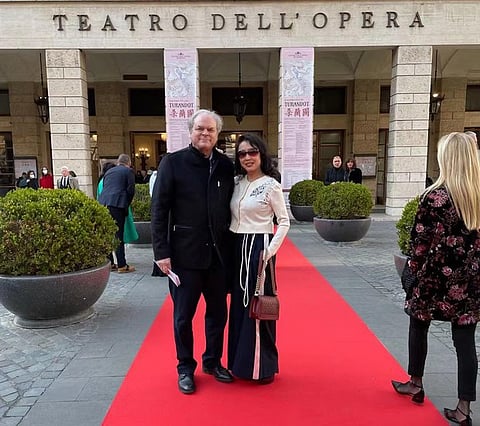In February 2019, the crew of 'One Second' traveled to Berlin for the Berlin International Film Festival. They met at Yan's house, looking forward to seeing it presented in competition for a Golden Bear award, and entered the venue on the red carpet together with her.
But the movie was withdrawn abruptly just one hour before its scheduled media screening, allegedly for "technical reasons."
Further delays ensued before the film was eventually released in November 2020 after Zhang made several edits and deletions to satisfy Chinese officials.
When the film finally did appear, there was no mention of Yan.
Walker said he has requested that Zhang and the production company restore Yan's credit, as well as contacting the Hollywood Screenwriters' Guild, of which Yan is a member, French film distribution company Wild Bunch of Paris, online platform Mubi, the Toronto Film Festival and the San Sebastian International Film Festival in Spain.
He asked them to consider whether they wanted to show films that didn't respect the right of authors on their platforms. Mubi has since reinstated a reference to Yan as the author of the novel that inspired "One Second."
But Walker said he had stopped short of taking legal action in China.
"We did also discuss whether to pursue a lawsuit in China, but the judiciary ... are all of a piece with the government, so complaining about things in China is meaningless," Walker said. "We started thinking that maybe we could stop this sort of thing happening abroad instead."
"They can do this in China because they have all the power, but overseas, authors have copyright, intellectual property rights, and moral rights," he said.
Zhao Yijun of the Huanxi Media Group, which invested in "One Second," told the couple that Yan's name was removed for political reasons, on orders from the State Administration for Radio, Film, and Television (SARFT), and that Huanxi was obliged to implement that order.
Zhao also tried to threaten Yan if she tried to speak out about the move overseas.
"He said it was the SARFT that insisted on removing her name," Walker said. "He said that Yan is up against an entire country, one individual, which immediately made [him] think about the Tiananmen Tank Man, meaning that the power of the state is many times greater than that of any individual."
Walker said Yan's outspoken criticism of official cover-ups in the early days of the COVID-19 pandemic in Wuhan had also made her persona non grata in Beijing.
Yan also referred to CCP leader Xi Jinping as "also a human trafficker" in connection with the Jiangsu chained woman incident, not realizing that the conversation she was having was being streamed life online.
The CCP’s ban has likely brought heavy economic losses for Yan, too.
Sweden-based translator Wan Zhi said Zhang Yimou, once lauded as a member of the cutting-edge fifth generation of Chinese directors, has long since sold out to Beijing.
"Zhang Yimou is the pet director of the hollow men ... he has no personality or rights of his own," Wan said. "He's like a puppet."
"The Chinese authorities are becoming more and more shameless and more and more like criminals," Wan said. "If it doesn't want you talking about politics, then you can't talk about politics."
Repeated calls to Zhao Yijun's cell phone were answered but the line immediately cut off this week. (AA/RFA)


